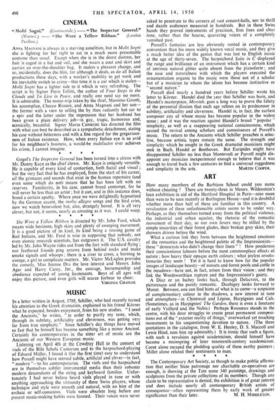MUSIC
IN a letter written in August, 1788, Schiller, who had recently turned his attention to the Greek dramatists, explained to his friend Korner what he expected, besides enjoyment, from his new studies. " I need the Ancients," he writes, " in order to purify my taste, which, through its subtlety, artificiality and cleverness, was getting very far from true simplicity." Since Schiller's day things have moved so fast that he himself has become something like a minor Ancient. Certainly his contemporaries in the sister art of music are the Ancients of our Western European music.
Listening on April 4th at the Cowdray Hall to the consort of viols of the Bale Schola Cantorum and to the harpsichord-playing of Eduard Muller, I found it (for the first time) easy to understand how Purcell might have seemed subtle, artificial and clever—in fact, " modern "—to his contemporaries. The viols and the harpsichord are in themselves subtler instrumental media than their robuster modern descendants of the string and keyboard families. Unfor- tunately I had never before heard viols played in tune or with anything approaching the virtuosity of these Swiss players, whose technique and style were smooth and natural, with no hint of the archaic or self-conscious. Viols were obsolete long before our present music-making habits were formed. Their voices were never asked to penetrate to the corners of vast concert-halls, nor to thrill and dazzle audiences measured in hundreds. But in these Swiss hands they proved instruments of precision, firm lines and clear - tone, rather than the hoarse, quavering voices of a completely vanished past.
Purcell's fantasias are less obviously rooted in contemporary convention than his more widely known vocal music, and they give a much better idea of the genius that was lost to English music at the age of thirty-seven. The harpsichord Suite in C displayed the range and brilliance of an instrument which has a certain kind of intrinsic natural glitter quite absent from the pianoforte ; and the ease and naturalness with which the players executed the ornamentation organic to the music were those not of a scholar but of a musician to whom the idiom has become instinctive or " second nature."
Purcell died nearly a hundred years before Schiller wrote his letter to Korner. Handel died the sear that Schiller was born, and Handel's masterpiece, Messiah, goes a long way to prove the falsity of the perennial illusion that each age refines on its predecessor in subtlety, artificiality and cleverness. Handel is, in fact, the earliest composer any of whose music has become popular in the widest sense ; and it was the reaction against Handel's broad " popular " simplicity, as well as a reappearing national consciousness, which caused the revival among scholars and connoisseurs of Purcell's music. The return to the Ancients which Schiller preaches is selec- tive, -because artistic types remain the same. The strength and simplicity which he sought in the Greek dramatist musicians might seek in Bach, Handel or Beethoven. But Euripides might have disappointed Schiller no less than Montevedi or Purcell might dis- appoint any musician inexperienced enough to believe that it was enough to travel back a few centuries to find a universal ruggedness






































 Previous page
Previous page